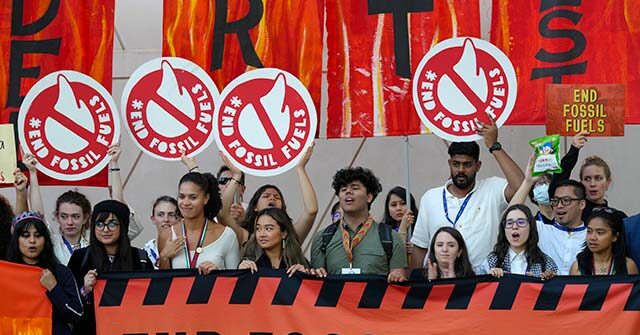Top News
U.N. Climate Summit Wraps Up Without Agreement to Eliminate Fossil Fuels

The unhappy COP28 climate alarmism summit in Dubai rolled into its final scheduled day on Tuesday without the crown jewel sought by hardcore activists: a worldwide agreement to phase out fossil fuels.
The United Arab Emirates (UAE), host of this year’s summit, released a draft copy of the grand finale climate agreement on Monday that did not include language calling for a rapid phase-out of fossil fuels. Instead, the draft called on all nations to reduce “consumption and production of fossil fuels” in a “just, orderly, and equitable manner.”
Climate activists erupted in fury at what they called a “weak” agreement that would not do enough to reduce carbon emissions. Many of them were already unhappy that COP28 was hosted by a fossil fuel superpower and presided over by no less than the chief executive of the UAE national oil company, Sultan Ahmed Al Jaber.
Al Jaber has been an outspoken critic of the proposed fossil fuel phase-out since before the summit began.
“I’m not in any way signing up to any discussion that is alarmist. There is no science out there, or no scenario out there, that says that the phase-out of fossil fuel is what’s going to achieve 1.5C,” Al Jaber said during an online event in November, referring to the climate goal of keeping planetary temperature increases below 1.5 degrees Centigrade above pre-industrial levels.
“Please help me, show me the roadmap for a phase-out of fossil fuel that will allow for sustainable socioeconomic development, unless you want to take the world back into caves,” he added.
No one else at the online conference was able to provide the science or sustainable development plans the sultan requested, but he emerged as the villain of the exchange in the eyes of climate activists, who were not among his biggest fans, to begin with. Al Jaber later insisted his remarks during the online event were “taken out of context” and indicated he might be willing to support a phase-out plan.
A European Union (EU) representative told the BBC on Tuesday that the draft agreement would be “unacceptable” without a fossil fuel phase-out. A representative for the Alliance of Small Island States said signing an agreement without “strong commitments on phasing out fossil fuels” would be tantamount to signing a “death certificate” for islanders.
A representative from the Biden administration said the agreement “needs to be substantially strengthened,” while the United Kingdom said it “does not go far enough.”
Reuters reported on Tuesday afternoon that COP28 participants felt the summit would go into “overtime” until a stricter agreement could be negotiated. The Emirati director of the COP28 summit, Majid Al Suwaidi, said the controversial draft released on Monday was intended to stimulate discussion.
“By releasing our first draft of the text, we got parties to come to us quickly with those red lines,” he said.
“I think there’s progress and moving in the right direction. And you know, we’re going to keep working through the night,” said the Biden administration’s climate envoy, former Sen. John Kerry.
Reuters recounted some backstage drama behind the Monday draft, which might have backed away from demanding a fossil fuel phase-out, but was historically stringent in discussing restrictions on all such fuels. Saudi Arabia and other members of the Organization of the Petroleum Exporting Countries (OPEC) reportedly pressured Al Jaber to drop the fossil fuel language entirely.
OPEC members, including OPEC+ member Russia, may yet refuse to sign any agreement that calls for a phase-out. China, the world’s heaviest carbon emitter, would probably also balk at harsh restrictions, although Chinese climate envoy Xie Zhenhua has spoken enigmatically of the idea.
Some of the developing nations that might theoretically agree to a fossil fuel ban will demand generous exemptions for themselves. Zambia’s “green economy” minister Collins Nzovu, for example, said COP28 should recognize “the full right of Africa to exploit its natural resources sustainably.”
About 80 percent of the world’s energy comes from fossil fuels, so citizens of developed nations are unlikely to look favorably upon an agreement that condemns them to rolling blackouts and the end of personal transportation while Third Worlders get to pump and burn as much oil and coal as they need.
Voice of America News (VOA) on Tuesday quoted climate activists who absolutely do expect the Western world to suffer because it allegedly bears the historical burden of causing climate change with their rapacious technocratic greed:
Veteran COP observer Meena Raman of environmental activism group Friends of the Earth’s Malaysia chapter blasted industrialized nations, which caused the problem with historical emissions that stay in the atmosphere for hundreds of years. And countries like the United States, Canada and Norway are expanding oil production, she said.
“They don’t want to talk about historical responsibility but talk about keeping 1.5 alive,” Raman said. “It’s really playing to the gallery. Fossil fuel expansion is already happening in the global north.”
The climate activists and high-rolling politicians who fly into meetings like COP28 on private jets have not been very honest with the general public about the depth of the sacrifices that would be necessary to meet that 1.5C temperature goal. Phasing out fossil fuels completely, on a planetary scale, is not something the American voter was told about when the Paris Climate Accords were trumpeted to the world in 2015. In fact, the original Paris Agreement called for a 2C temperature limit because the restrictions necessary to hit 1.5C were considered extreme.
COP28 is edging closer to the truth: those “ambitious” climate goals will involve canceling a huge percentage of the world’s energy production, and there cannot be any carve-outs for developing nations, much less pollution kings like China.
Read the full article here


















